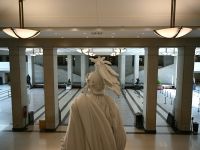Occupation: Actor, Comedian, Producer
Date of Birth: April 3, 1961
Place of Birth: Brooklyn, NY, USA
Sign: Sun in Aries, Moon in Scorpio
Relations: Mother: Lillian Murphy Lynch (telephone operator; father: police officer (deceased); stepfather: Vernon Lynch (factory foreman); brother: Charles (aka Charlie) Murphy (actor, screenwriter); stepbrother: Vernon Lynch Jr.; wife: Nicole Mitchell (model); kids: Bria, Miles Mitchell, Shayne Audra, and Zola Ivy (with Mitchell); Christian (with Tamara Moore)
Education: Attended Nassau Community College
NEARLY TWO DECADES ago, Eddie Murphy first appeared on Saturday Night Live. In a world, and field, that is notoriously void of roles for African-Americans, Murphy's longevity is testament to both his ability and his resilience.
Even as a child growing up in 1960s Brooklyn, Murphy entertained everyone around him with "funny voices" he had heard on television. By the time he was a teen, he was adept at "ranking," an insulting contest between his friends – yes, the original "Your momma's so ugly…" An arrogant young man, Murphy wore ascots and carried himself with the air of someone who knows he's going places.
At 18, Murphy began competing in comedy talent contests. After enduring agonizing competition (not to mention abject racism) in a particularly grueling Long Island series of bar talent shows, Murphy managed to land a regular gig at one small bar. Once Murphy realized how few black comics were actually working in the late '70s, the two words “Richard Pryor” became very important to him and he set about studying Pryor's work, determined to be a success despite the odds.
While honing his skills at night, Murphy worked as a shoe salesman during the day, adding classes at Nassau Community College to sharpen his observations. At the time, there were no such thing as "stand-up comedy classes." In 1980, he landed a writing job on Saturday Night Live – a twist of fate he says was simply because they needed a token black person, which the sketch show hadn't had since founding member Garrett Morris. Thanks to his talent, though, he quickly rose through the ranks to become a regular player, charming audiences with his portrayals of Gumby, Mr. Robinson and Tyrone Green – of "C-I-L-L my landlord" fame.
Although these days, it's commonplace for SNL players to make the transition to the big screen, back then, it was a risky proposition. Murphy made the move with aplomb, debuting opposite Nick Nolte in 1982's 48 Hours, then following it up with the now-classic Trading Places, which put him opposite one of SNL's founding members, Dan Aykroyd.
Political opposition to Murphy grew as quickly as his fame, and for every person who saw his movies – and there were millions – two more were boycotting him, whether for his misogynist comments, his homophobia or any number of other offenses Murphy consistently spewed out. The boycott didn't seem to have much impact, though: Murphy landed a $15 million deal with Paramount, a coveted Barbara Walters prime-time interview slot, and comedy albums galore. In 1984, Murphy made a huge breakthrough, creating the franchise role of Axel Foley in Beverly Hills Cop. He was a bona-fide movie star.
Along with all the money and fame, Murphy was given enormous responsibility: many people expected him to single handedly eliminate racism in Hollywood. When he didn't come through with the impossible, he was labeled "establishment" and a "sell-out." When his core fans deserted him, the decline of Eddie Murphy began.
For ten years, Murphy struggled, releasing numerous films but hardly capturing the public's eye as he had earlier. By 1994, he was considered a "has-been," compared frequently to Burt Reynolds as a performer who had stuck with one "type" too long. Both Reynolds and Murphy – separately – rebounded to prove their critics wrong.
Then came 1996 and The Nutty Professor. Eddie Murphy, all grown up, was back. Or was he? His next few films were miserable, but with 1998's Doctor Dolittle, it seemed that maybe the potential for a career resurrection was there. In early 1999, he scored big-time with Martin Lawrence in the buddy picture Life, following that up with an inspired dual role in Steve Martin's Bowfinger. Combined with his "day job" doing a voiceover role on the television series The PJs, Murphy had his finger in all the pies once again.
Movies:
2000 The Nutty Professor II
2000 Pluto Nash
2000 Shrek
1999 Bowfinger
1999 Life
1999 Toddlers
1998 Holy Man
1998 Doctor Dolittle
1998 Mulan
1997 Metro
1996 The Nutty Professor
1995 Vampire in Brooklyn
1994 Beverly Hills Cop III
1992 Boomerang
1992 The Distinguished Gentleman
1990 Another 48 Hrs.
1989 Harlem Nights
1988 Coming to America
1987 Beverly Hills Cop II
1987 Eddie Murphy Raw
1986 The Golden Child
1985 The Joe Piscopo Video
1984 Best Defense
1984 Beverly Hills Cop
1983 Trading Places
1983 Eddie Murphy Delirious
1982 48 Hrs.
TV:
1999 The PJs
1989 What's Alan Watching Now?
1981-84 Saturday Night Live
© 2000 Al Bawaba (www.albawaba.com)







